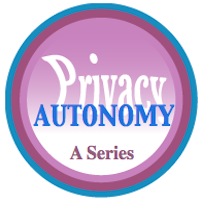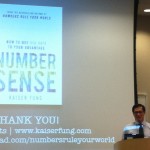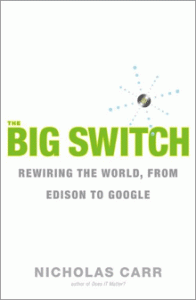 How to Protect Yourself from Pervasive Surveillance and Control shows how you can act to protect yourself, your family and your community from the rise of digitally enabled surveillance and control. How to Protect Yourself from Pervasive Surveillance and Control shows how you can act to protect yourself, your family and your community from the rise of digitally enabled surveillance and control.
Privacy and Autonomy in the Digital Age is a series I’m writing to share my insights into disruptive risks that we face, individually and collectively, due to the digitization of the world. As I wrote in Part1, my technology adoption crystal ball says that the convergence of pervasive digital data, smart devices and their centralized [cloud] control enables unprecedented surveillance and control of people at a very low cost. This post offers various suggestions for mitigating the risks, while Police State Scenarios (Part3) discusses ways that collective permanent loss of autonomy could unfold.
[…]
 Behavioral economics autonomy and ethics is a thought experiment on how to approach “doing good” when applying the emerging practice of behavioral economics. Along with big data analytics and cognitive science, behavioral economics affords businesses, governments and other organizations unprecedented impact on individuals’ behavior, even without their consent or awareness. This arouses serious ethical and social dilemmas. Behavioral economics autonomy and ethics is a thought experiment on how to approach “doing good” when applying the emerging practice of behavioral economics. Along with big data analytics and cognitive science, behavioral economics affords businesses, governments and other organizations unprecedented impact on individuals’ behavior, even without their consent or awareness. This arouses serious ethical and social dilemmas.
Every behavioral economics practitioner I’ve met has emphasized the importance of using its practice “for good” in order to help people. Like all other human endeavors, however, “for good” is open to interpretation, so I’ll apply my experience with ethnographic and behavioral analysis of social media to reflect on what “for good” might mean in light of individual and group autonomy.
I also hope this Noodle will be food for thought for executives who hire behavioral economics firms as well as all of us who are invariably its subject. In a similar vein, most designers I know are committed to using design principles to improve user experience, and there’s considerable overlap between design and behavioral economics.
Behavioral economics is […]
Digital Transformation’s Personal Issue reveals personal treatment to be the key to breakthrough customer experience, and it shows how digital social spaces enable Chief Digital Officers to use personal treatment to create more profit. Before they arrive, though, they need to lead their organizations through the Personal Issue. 
The Personal Issue refers to a perceived conflict between empowered customers and profit-starved companies. Digital social technologies are enabling customers to “re-personalize” business and society because their online interactions among themselves are personal, which is changing their expectations of all interactions.
However, businesses resist treating customers personally because they fear cost and inefficiency. They don’t understand the digital social economics of treating customers personally online, at scale.
Meanwhile, the missions of chief digital officers (CDOs) and chief customer officers (CCOs) are creating bold new “customer experience” and profits by using digital technologies to transform organizations, brands and businesses. They will fulfill their missions far more quickly and completely by using the key.
[…]

[UPDATED] Big Data Practical Primer is my notes from Kaiser Fung’s presentation at Big Frontier in which he highlighted his new book, Numbers Rule Your World. Big data is a simple word, but its nuances are critical and require a new way of thinking. This presentation did a good job of covering many high-level definitions and issues of big data & analytics and combined those with some practical how-tos that may surprise you. It can be fairly easy to make serious impact, but, as I suggest in Insights, the biggest barrier to big data is one of imagination and the requirement to think creatively about using data correctly to make business decisions that pay off.
[…]
 In case you missed it, this seminal post from the New York Times shows a startling example of “big data” hitting retail. Data collection and mining have enabled Target, for example, to predict what degree of pregancy young mothers are in—based on the kind of things they buy. In case you missed it, this seminal post from the New York Times shows a startling example of “big data” hitting retail. Data collection and mining have enabled Target, for example, to predict what degree of pregancy young mothers are in—based on the kind of things they buy.
Although Valley visionaries and enterprise data engineers have been talking about “big data” for years, this post brings it down to the personal retail level. Due to the growing appreciation of social data and behavior, data scientists and marketers now have the glue to use data to increase relevance to customers and clients.
In this post’s main example, data engineers analyzed purchase behavior of pregnant mothers, sifting through voluminous retail data, and they found plenty of patterns that indicated that women were pregnant, down to the trimester! Obviously, enterprises have a large responsibility to use data in ways that won’t violate trust, and many will make mistakes in their efforts to pump up quarterly numbers.Put another way, buying transactions are *very* social, so retailers, whether bricks and mortar or ecommerce, will unleash tremendous intelligence in […]
Understanding Web 3.0 as Data: Reid Hoffman, Founder LinkedIn summarizes business opportunities and privacy threats of the emerging sea of social data as well as outlining Web 3.0 key concepts and importance.
 In addition to being the founder of LinkedIn, Reid Hoffman is a Valley insider with rich insight into technology trends, markets and building companies. His main message in this talk at South by Southwest 2011 was that the future was bearing down on us, and he prophesied that it would “arrive sooner and be stranger than we think.” In addition to being the founder of LinkedIn, Reid Hoffman is a Valley insider with rich insight into technology trends, markets and building companies. His main message in this talk at South by Southwest 2011 was that the future was bearing down on us, and he prophesied that it would “arrive sooner and be stranger than we think.”
He painted the context for his theme, “Web 3.0 as data,” with a simple timeline: […]
Curmudgeonly Looking into the Past to Divine the Future—That Nagging Privacy Issue—Debunking the Elephant
 The Big Switch is a valuable book that reflects what has become Nick Carr’s trademark role, heckling IT and Web enthusiasts, albeit from good seats. Carr seems to relish his role as “the fly in the ointment” of the idealistic IT-enabled world that Web missionaries espouse. Although this book has shortcomings, I recommend it for two reasons. First, Carr makes a convincing and useful argument that the “electrification” of business and society (the Edison part) has valuable lessons for the “computerization” transformation of business and society (the Google part) that is currently unfolding. This parallel provides context to think about some of the disruptions around your business, society and career. Second, Carr raises serious questions about possible privacy implications of computerization. He palpably weighs in on the dark side and seems to want the world to change course from the “googlization of life.” If you haven’t read The Long Tail, I would read these books in proximity because they are very complementary and both quick, important reads. The Big Switch is a valuable book that reflects what has become Nick Carr’s trademark role, heckling IT and Web enthusiasts, albeit from good seats. Carr seems to relish his role as “the fly in the ointment” of the idealistic IT-enabled world that Web missionaries espouse. Although this book has shortcomings, I recommend it for two reasons. First, Carr makes a convincing and useful argument that the “electrification” of business and society (the Edison part) has valuable lessons for the “computerization” transformation of business and society (the Google part) that is currently unfolding. This parallel provides context to think about some of the disruptions around your business, society and career. Second, Carr raises serious questions about possible privacy implications of computerization. He palpably weighs in on the dark side and seems to want the world to change course from the “googlization of life.” If you haven’t read The Long Tail, I would read these books in proximity because they are very complementary and both quick, important reads.
As […]
From a technology standpoint, social technologies merely digitize certain things that we already do when relating to one another socially. The rub is, most people aren’t terribly aware of how they relate to others or the process they go through when assessing others. This lack of awareness prevents them from using social technologies to create value. From time immortal, people have required periods of experimentation to “get” new technologies and to use them appropriately: flint, fire, gunpowder, electricity, Twitter… […]
Review and Analysis of the twenty-first century’s first decade, how Web 1.0 and Web 2.0 are disrupting executives, enterprises, society and government.. crowdsourcing, collaboration, innovation, privacy, globalization, terrorism, organizational unbundling, and how to thrive in the Knowledge Economy’s accelerating volatility, which will spell the end of many Industrial Economy enterprises. […]
Why Twitter was one of the Web 2.0 innovations of the decade.. analysis and conclusions about Twitter’s value proposition for changing the economics of the Relationship Life Cycle […]
|
|
 How to Protect Yourself from Pervasive Surveillance and Control shows how you can act to protect yourself, your family and your community from the rise of digitally enabled surveillance and control.
How to Protect Yourself from Pervasive Surveillance and Control shows how you can act to protect yourself, your family and your community from the rise of digitally enabled surveillance and control.
 Behavioral economics autonomy and ethics is a thought experiment on how to approach “doing good” when applying the emerging practice of behavioral economics. Along with big data analytics and cognitive science, behavioral economics affords businesses, governments and other organizations unprecedented impact on individuals’ behavior, even without their consent or awareness. This arouses serious ethical and social dilemmas.
Behavioral economics autonomy and ethics is a thought experiment on how to approach “doing good” when applying the emerging practice of behavioral economics. Along with big data analytics and cognitive science, behavioral economics affords businesses, governments and other organizations unprecedented impact on individuals’ behavior, even without their consent or awareness. This arouses serious ethical and social dilemmas.

 In case you missed it, this seminal post from the New York Times shows a startling example of “big data” hitting retail. Data collection and mining have enabled Target, for example, to predict what degree of pregancy young mothers are in—based on the kind of things they buy.
In case you missed it, this seminal post from the New York Times shows a startling example of “big data” hitting retail. Data collection and mining have enabled Target, for example, to predict what degree of pregancy young mothers are in—based on the kind of things they buy. In addition to being the founder of LinkedIn, Reid Hoffman is a Valley insider with rich insight into technology trends, markets and building companies. His main message in this talk at South by Southwest 2011 was that the future was bearing down on us, and he prophesied that it would “arrive sooner and be stranger than we think.”
In addition to being the founder of LinkedIn, Reid Hoffman is a Valley insider with rich insight into technology trends, markets and building companies. His main message in this talk at South by Southwest 2011 was that the future was bearing down on us, and he prophesied that it would “arrive sooner and be stranger than we think.” The Big Switch is a valuable book that reflects what has become Nick Carr’s trademark role, heckling IT and Web enthusiasts, albeit from good seats. Carr seems to relish his role as “the fly in the ointment” of the idealistic IT-enabled world that Web missionaries espouse. Although this book has shortcomings, I recommend it for two reasons. First, Carr makes a convincing and useful argument that the “electrification” of business and society (the Edison part) has valuable lessons for the “computerization” transformation of business and society (the Google part) that is currently unfolding. This parallel provides context to think about some of the disruptions around your business, society and career. Second, Carr raises serious questions about possible privacy implications of computerization. He palpably weighs in on the dark side and seems to want the world to change course from the “googlization of life.” If you haven’t read The Long Tail, I would read these books in proximity because they are very complementary and both quick, important reads.
The Big Switch is a valuable book that reflects what has become Nick Carr’s trademark role, heckling IT and Web enthusiasts, albeit from good seats. Carr seems to relish his role as “the fly in the ointment” of the idealistic IT-enabled world that Web missionaries espouse. Although this book has shortcomings, I recommend it for two reasons. First, Carr makes a convincing and useful argument that the “electrification” of business and society (the Edison part) has valuable lessons for the “computerization” transformation of business and society (the Google part) that is currently unfolding. This parallel provides context to think about some of the disruptions around your business, society and career. Second, Carr raises serious questions about possible privacy implications of computerization. He palpably weighs in on the dark side and seems to want the world to change course from the “googlization of life.” If you haven’t read The Long Tail, I would read these books in proximity because they are very complementary and both quick, important reads.